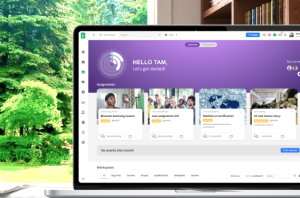Skills-based organisations help employees grow by improving and enhancing specific skills and competencies. This blog post explores 6 instances when reskilling your workforce is crucial.
The World Economic Forum estimates that six in 10 workers will require training before 2027 to embrace the changing nature of jobs. This data emphasises the need for businesses to prioritise and invest in ongoing training and reskilling initiatives.
Failing to do so risks your workforce’s productivity and competitiveness and threatens your business’s long-term viability.
Skills-based organisations maintain a capable and flexible workforce. And by understanding current and future talent requirements, they remain adaptable and thrive in a fluid environment.
This post explains what a skills-based organisation is and its positive effects on employers and employees. We’ll outline seven reasons for re-skilling and updating your workforce. Armed with this understanding, you can create strategies to improve your company’s flexibility, competitiveness, and overall success.
What is a skills-based organisation?
A skills-based approach allows you to understand what skills you have and what you need, helping you take action to bridge the gap.
As 63% of current work extends beyond people’s core job descriptions, a skills-based approach focuses on pinpointing skill gaps. Employees are no longer confined to their job titles; they are recognised as individuals with versatile skills and capabilities that can be used flexibly to match their interests and the changing priorities of the business.
Taking a skills-based approach benefits both employers and workers in several ways. For you, it allows for more precision in role matching, reduces employee churn, and prevents people working in silos. And for workers, it enables individuals to be placed in roles that align with their strengths and expertise–increasing job satisfaction.
A new framework for reskilling employees
The opportune moment for workforce development arises when current skills don’t match the business’s changing needs.
Regular assessments spot emerging trends and technological changes. Skills-based organisations help individuals navigate job market changes with a broad skill set. This boosts job satisfaction by aligning employees with roles matching their skills and interests, leading to increased happiness through engaging tasks. It also creates avenues for career growth as individuals learn diverse, valuable skills.
Considering that most organisations (93%) are concerned about employee retention, a skills-based method effectively tackles employee churn and the struggle to find suitable candidates for vital roles. The approach allows you to draw in a larger and more qualified pool of applicants for open positions.
Let’s put that into perspective.
Imagine a company implementing a skills-based strategy for its sales team. Instead of relying solely on traditional performance metrics, the evaluation process considers individual skills crucial for sales success, such as good communication, relationship-building, and negotiation.
This method evaluates each salesperson’s performance by considering their expertise in specific skills. It gives a more precise picture of their contributions to the team’s success, ensuring fair evaluations. It also empowers employees to improve the skills directly related to their job responsibilities.
A Learning Experience Platform (LXP) like Blossom can provide comprehensive employee performance reports to help you assess, monitor, and improve learning in your organisation.
Challenges with skills-based strategies
Individuals must take ownership of their learning needs for a skills-based strategy to succeed. Building a culture of trust among employees so that they openly acknowledge skill gaps and actively participate in skill enhancement initiatives can be difficult. Shifting the mindset toward continuous learning and improvement is a cultural challenge.
Secondly, the accuracy of skills-based insights relies on trustworthy data. Corrective actions require the whole team’s involvement, emphasising the collaborative effort needed for successful skills-based initiatives. This highlights the importance of trust in recognising and addressing potential issues in learning and development (L&D) programmes.
Thirdly, challenges in skills-based organisations often include gaining buy-in from the C-Suite for L&D initiatives. Demonstrating the return on investment (ROI) is crucial for securing continued support.
Employees and leadership may resist adopting a skills-based approach due to fear of change or a preference for traditional job roles. Overcoming this resistance and fostering a mindset of continuous learning can be challenging.
Overcome these challenges and understand the impetus for reskilling and updating your workforce. Let’s explore next.
When should you re-skill and update your workforce?
1. Technological advances
Technological changes reshape the skill landscape, potentially rendering current roles obsolete due to automation and innovations.
Since 93% of UK businesses say there is an IT skills gap, a skills-based approach to talent management can help you address it. What’s more, 42% of these businesses say the problem is due to the fast pace of technological advancements, including artificial intelligence (AI) and automation. This increased demand for skills means prioritising hiring or upskilling employees with in-demand tech skills to meet job requirements.
For example, if a company starts using AI software, employees might need re-skilling to use these tools proficiently. If they don’t get trained on the latest technology, it could lead to problems in doing tasks and make the work less efficient, reducing productivity.
Additionally, IT employees at risk of redundancy or redeployment can improve their skills to help secure alternative jobs. By focusing on skill development, these individuals increase their chances of securing alternative employment and remain valuable contributors, even when facing changes in their current roles.
Identify roles susceptible to factors such as automation and AI. Use a skills-based approach and ensure your workforce has skills that complement, oversee, or enhance technological advancements.
2. Industry changes, market trends, and consumer preferences
Market trends like the continued growth of online shopping force workers to reskill. They may need to gain the skills to effectively navigate digital platforms, manage online transactions, or engage in e-marketing strategies.
Businesses can adapt to this trend with a skills-based approach. By focusing on the skills needed to meet evolving market demands, employees in the retail sector can develop proficiency in e-commerce tools, online marketing techniques, and data analysis for consumer insights. This approach helps respond to changing circumstances–ensuring continued relevance and competitiveness.
3. Regulatory compliance
Non-compliance costs a business more than just money. It may lead to hefty fines and also harm your reputation. Taking a skills-based approach to maintaining regulatory compliance means you can reduce risks associated with:
- Legal non-compliance. Failure to adhere to the Equality Act 2010, for example, increases the risk of legal action, fines, and reputational damage.
- Discrimination issues. Lack of awareness of protected characteristics, such as disability and gender, can result in unintentional discriminatory practices in recruitment, promotion, and day-to-day operations, leading to potential employee dissatisfaction and legal challenges.
- Negative workplace culture. Inadequate handling of diversity and inclusion matters. A hostile workplace culture, reduced employee morale, and increased turnover due to an environment perceived as discriminatory or unfair.
- Employee relations challenges. Poor management of discrimination-related grievances can strain workplace relationships, increase conflicts, and decrease trust among colleagues and managers.
- Reputational damage. Public perception of your organisation’s commitment to equality can affect customer trust, stakeholder relationships, and your ability to attract and retain top talent.
New laws require employees to learn new skills, creating a need for reskilling. To reduce risk and enhance your reputation, adopt a skills-based approach. This approach builds a workplace culture prioritising integrity, safety, and responsible business conduct by aligning employees with legal and ethical standards.
4. Organisational restructuring
Did you know the average employee experiences 10 planned employer changes, such as a business transformation or operational restructuring, in a year?
Skills-based organisations restructure successfully by ensuring employees have the necessary skills, fostering adaptability, and facilitating a smooth transition to the new structure.
By identifying core competencies necessary for redesigned roles and functions, you can ensure employees have the skills to work in the new structure, improving efficiency and effectiveness.
Plus, this approach allows for the strategic deployment of talent based on their skills, ensuring individuals are placed where they can contribute most effectively to the new organisational objectives. This optimisation enhances productivity and supports a more efficient and agile organisational structure.
The impact? Skills-based organisations have a smoother transition, reduce resistance, and nurture employees’ positive mindsets.
5. Emerging skill demands
Consider a manufacturing setting where new machinery is introduced. Without proper training, workers may operate the machines incorrectly, leading to inefficiencies, errors, and potential safety hazards.
A skills-based approach to talent development can bridge this gap by providing targeted training on the operation and maintenance of the new machinery. This ensures that employees have the necessary skills to operate the equipment safely and efficiently, reducing errors and enhancing overall productivity.
Furthermore, the 2023 Global Leadership Forecast reveals that leaders consider skills such as identifying and developing future talent, managing successful change, and influencing others crucial for success. However, only 12% of leaders assess themselves as effective.
Skills-based organisations address gaps in leadership skills with reskilling opportunities by offering:
- Targeted training and development programs. Once gaps are identified, specific programs are implemented to ensure leaders receive focused development to improve deficient skills.
- Personalised learning paths. Leaders can undergo customised training based on their unique skill gaps, promoting more effective skill development.
- Succession planning opportunities. Potential leaders can be groomed by providing training and experiences to bridge identified gaps.
- Objective performance evaluation processes. Skills-based organisations set clear criteria for enhancing leadership skills. This ensures that performance is objectively evaluated based on the identified skills.
- Feedback and coaching. Continuous feedback is integral to skills-based organisations. Leaders receive ongoing coaching and feedback on their performance in specific skill areas, facilitating continued growth.
- Access to measurable skill progression data. Clear skill metrics allow businesses to rack the progression of leadership skills over time.
Blossom can help you transform employee skills through high-quality training and upskilling initiatives–unlocking the potential to turn your workplace into a skills-based organisation.
- “Blossom has changed the way we learn. It has elevated our capabilities to share our knowledge, qualify our mentors and employees, and positively impacted every user in the organisation.” –Liat Segal, HR Manager and Manager of Learning at PERACH
6. Global events
Economic recessions or downturns can lead to cost-cutting measures, affecting workforce development budgets. This means companies must prioritise upskilling and reskilling to enhance employee versatility and adaptability during challenging economic conditions.
External shocks, such as the pandemic, global expansion, and rising living costs, can disrupt our usual work patterns. A skill-based strategy upskills employees for roles related to these changes and can enhance workforce adaptability.
Plus, entering global markets requires cultural competence and diverse skills. Skill-focused organisations prioritise cross-cultural training and language proficiency and use global market insights for international business initiatives. They also equip employees with crisis management and resilience skills to adapt to unexpected challenges. Considering potential crises like the increasing cyber threat, adopting a skills-based approach to enhancing digital security skills becomes crucial.
Take a skill-based approach to workforce development
Skills-based organisations understand what skills they currently have, what skills are needed, and what skills they need to stay competitive.
This focused approach to workforce development helps employees grow in their careers. By improving and enhancing employees’ skills to improve performance, you can tackle workforce development challenges head-on and create an adaptable and resilient team.
Reskill and upskill your workforce with Blossom. Our LXP specialists will walk you through our platform and discuss your reskilling needs. Book a demo today.








